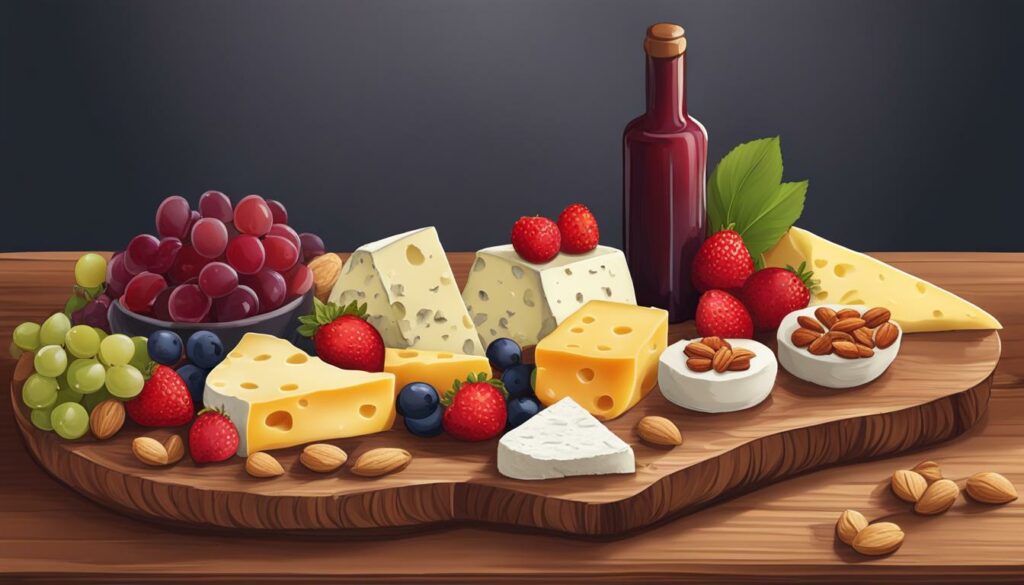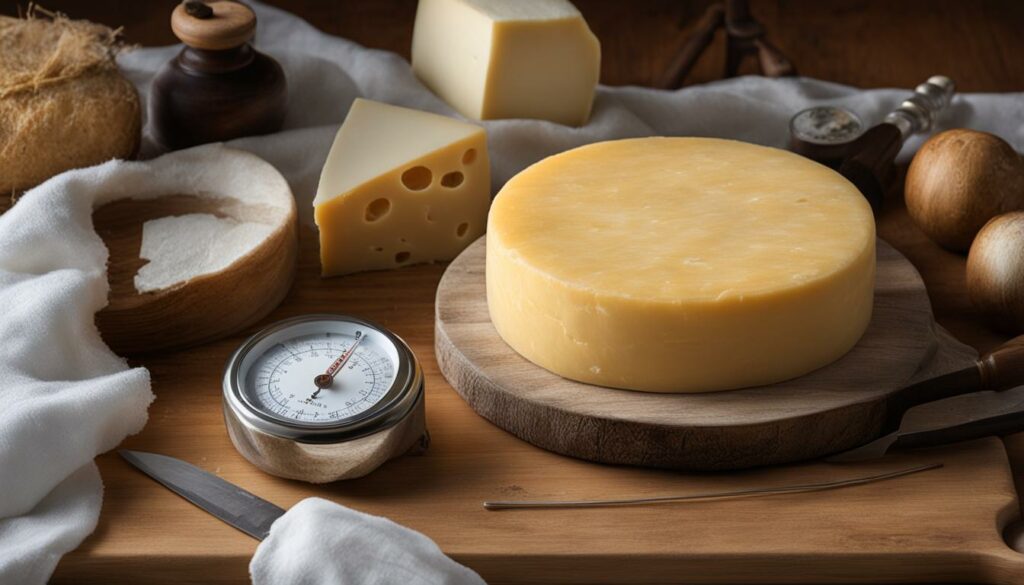Welcome to our article all about Blenda cheese! If you’re a cheese lover looking for a delicious and dairy-free option, Blenda cheese is the perfect choice for you. Made from cashews, this unique cheese offers intense flavors and a creamy texture that will delight your taste buds.
Blenda cheese comes in various varieties, including smoky, sharp, and mild cheddar. Its versatility makes it a great addition to a variety of recipes, such as quesadillas, caprese salads, and pizza. Whether you’re lactose intolerant or following a dairy-free diet, Blenda cheese is readily available online.
When it comes to nutrition, Blenda cheese has you covered. It’s high in healthy fats and protein, making it a satisfying and nutritious choice. So, if you’re looking to buy Blenda cheese, enhance your cooking skills, or simply want to explore the benefits of this delicious cheese, you’ve come to the right place.
Stay tuned as we dive into everything you need to know about Blenda cheese, from its ingredients and nutrition to the best recipes and where to find it. Get ready to unlock the world of dairy-free cheese that combines taste, quality, and convenience.
Are you ready to discover the best Blenda cheese varieties? Let’s get started!
The Appeal of Dairy-Free Cheese Alternatives
Many individuals who follow a vegan or dairy-free lifestyle still crave the flavors and textures of cheese. Fortunately, there are now numerous vegan cheese alternatives available in the market. These dairy-free cheeses are made from plant-based ingredients like nuts, seeds, tofu, and coconut. They come in various forms, including shredded, sliced, and spreadable. Vegan cheese can be purchased from grocery stores or made at home using simple ingredients and a blender.
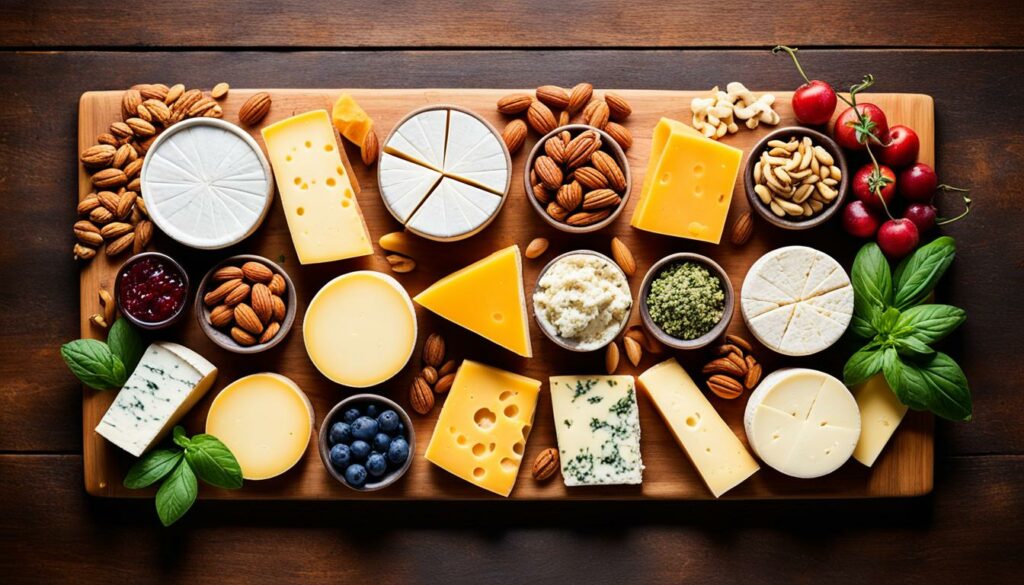
Some popular vegan cheese brands include Kite Hill Foods, Violife, and Miyoko’s Creamery. Whether store-bought or homemade, vegan cheese offers a tasty and cruelty-free alternative to traditional dairy cheese.
The Benefits of Vegan Cheese Alternatives:
- Plant-based ingredients provide a healthier option
- No lactose or cholesterol, suitable for lactose intolerant individuals
- Vegan cheese brands offer a wide variety of flavors
- Store-bought alternatives provide convenience
- Homemade recipes allow for customization and experimentation
- Environmentally friendly and sustainable choice
“Vegan cheese is a delicious and satisfying substitute for dairy-based cheese. Its availability and variety of flavors make it a great choice for those following a vegan or dairy-free diet.” – Jane Smith, Vegan Cheese Enthusiast
Whether you’re a vegan, lactose intolerant, or simply curious about exploring different cheese alternatives, vegan cheese is a versatile and delectable option.
| Vegan Cheese Brand | Popular Products |
|---|---|
| Kite Hill Foods | Almond Milk Cream Cheese, Ricotta |
| Violife | Cheddar Style Blocks, Mozzarella Style Shreds |
| Miyoko’s Creamery | Artisan Vegan Cheese Wheels, Vegan Butter |
With a wide range of flavors, textures, and dishes that can be created using dairy-free cheese, the options are limitless. Whether you’re enjoying it on a vegan pizza, sprinkling it onto a salad, or melting it into a grilled cheese sandwich, vegan cheese provides a satisfying and guilt-free indulgence.
Understanding the Different Types of Cheeses
Cheese comes in a wide variety of types, each offering its own unique characteristics and flavors. Understanding the different types of cheeses can help you choose the perfect option for your recipes or preferences. Let’s explore some of the most popular types:
Fresh Cheese
Fresh cheeses, like ricotta and mozzarella, are young cheeses that are not aged for an extended period. They have a soft and creamy texture and do not develop a rind. Fresh cheeses are perfect for spreading on crackers, adding to salads, or melting on top of a pizza.
Aged Fresh Cheese
Aged fresh cheeses, such as feta and queso fresco, are allowed to mature for a short period. They develop a wrinkled white to grey-blue rind as they age. These cheeses have a crumbly texture and offer a tangy flavor profile. Aged fresh cheeses are commonly used in Mediterranean and Mexican cuisines.
Soft White Rind Cheese
Soft white rind cheeses, like Camembert and Brie, are known for their luxurious and creamy interiors. These cheeses possess a distinct white, fuzzy rind that adds a delicate earthy flavor. They pair well with fruits, nuts, and crusty bread, making them an excellent choice for a cheese plate or a gourmet sandwich.
Semi-Soft Cheese
Semi-soft cheeses, such as Edam and Reblochon, have a range of textures and flavors. They can have a fine to thick grey-brown rind or an orange, sticky rind. These cheeses are versatile and work well in sandwiches, melting dishes, and as a standalone snack. Their creamy consistency and mild taste make them popular among cheese enthusiasts.
Hard Cheese
Hard cheeses are aged for an extended period and develop a crusty, grey rind. Cheddar and Parmesan are prime examples of hard cheeses. They have a firm and crumbly texture and offer robust flavors. Hard cheeses are often grated or shaved for use in pasta dishes, gratins, and salads.
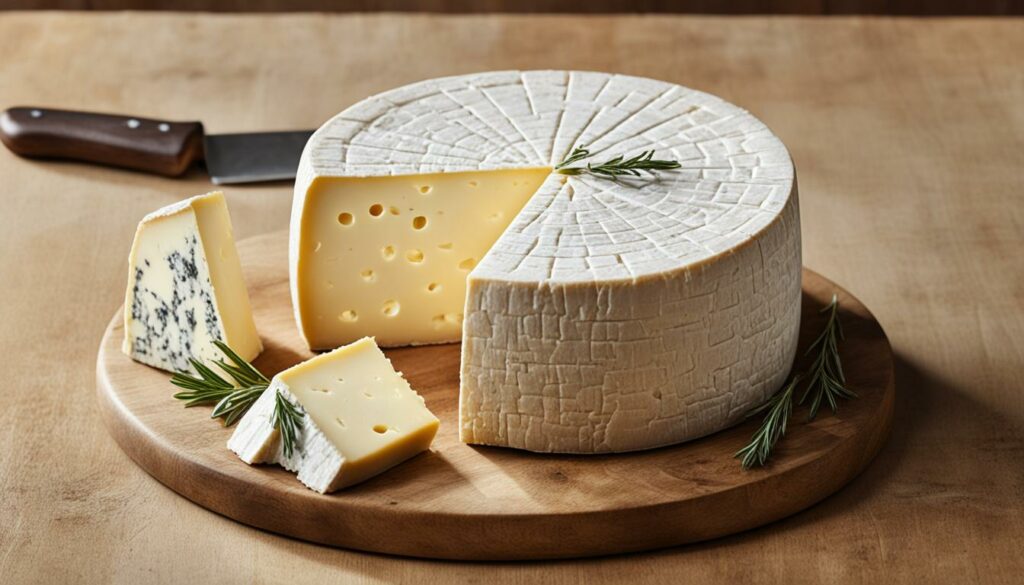
Blue Cheese
Blue cheeses, such as Stilton and Gorgonzola, have a distinctive appearance with a gritty, rough rind. These cheeses are characterized by their blue veins created by the presence of mold. Blue cheeses have a bold and tangy flavor that pairs well with fruits, honey, and crackers. They add a unique twist to salads, sauces, and dressings.
Flavored Cheese
Flavored cheeses are infused with additional ingredients like cumin, chives, or truffles to enhance their taste. These cheeses offer a burst of unique and tantalizing flavors that can elevate your culinary creations. Flavored cheeses are available in various combinations, allowing you to experiment with different profiles and find your favorites.
By understanding the different types of cheeses and their characteristics, you can confidently select the perfect cheese for any occasion or recipe. Whether you prefer a fresh and mild cheese or a rich and aged variety, there is a cheese out there to suit every palate.
Exploring Store-Bought Vegan Cheese Brands
If you’re looking for convenient and delicious dairy-free alternatives, store-bought vegan cheese brands have got you covered. With a wide range of options available, you can satisfy your cheese cravings while adhering to a plant-based lifestyle.
Variety of Vegan Cheese Options
Store-bought vegan cheese brands offer an array of delightful options to suit different tastes and recipes. Whether you’re in the mood for creamy spreads, meltable shredded cheese, or savory slices, there’s something for everyone.
- Vegan Cream Cheese: Indulge in the rich and creamy flavors of vegan cream cheese with options from Kite Hill Foods and Tofutti. Perfect for spreading on bagels, crackers, or using as a dip.
- Shredded Vegan Cheese: Create ooey-gooey plant-based dishes with shredded vegan cheese from Chao Creamery and Parmela Creamery. Use it for topping pizzas, nachos, or adding a cheesy touch to casseroles.
- Sliced Vegan Cheese: Enjoy the convenience of ready-to-use sliced vegan cheese from Field Roast Chao Creamery and Follow Your Heart. Elevate your sandwiches, burgers, or cheeseboards with their wide variety of flavors.
- Vegan Parmesan: Elevate your pasta dishes with a sprinkle of vegan parmesan from Follow Your Heart. This dairy-free alternative will add a delightful cheesy flavor to your favorite Italian recipes.
- Vegan Feta: Crumble vegan feta from select brands onto salads, pizzas, or Greek-inspired dishes for a tangy and salty flavor.
- Spreadable Vegan Cheese: Savor the taste of delectable vegan spreadable cheese wheels from Miyoko’s Creamery. Perfect for crackers, baguettes, or as a creamy addition to your favorite recipes.
- Vegan Ricotta: Explore the versatility of vegan ricotta from Kite Hill Foods. Use it to stuff pasta shells, top pizzas, or add richness to desserts.
- Vegan Mozzarella: Miyoko’s Creamery offers a satisfying vegan mozzarella option, perfect for melting and adding to pizzas, lasagnas, or any dish where you desire that gooey, stretchy texture.
With the increasing popularity of vegan cheese, the options available in stores continue to expand. You can find these delicious alternatives at your local grocery store or online.
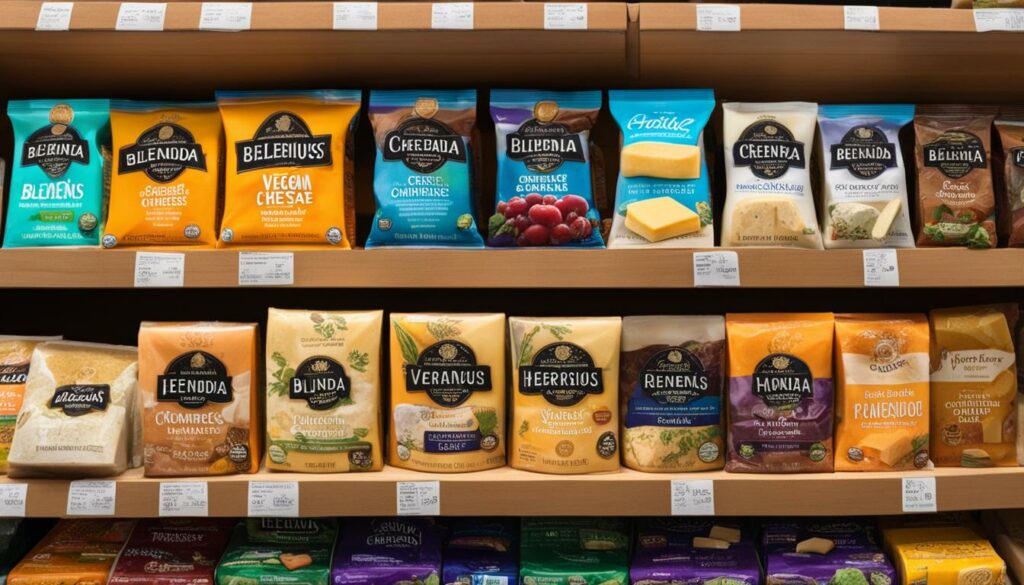
The Benefits of Homemade Vegan Cheese
Making vegan cheese at home offers a plethora of advantages. Not only do you have complete control over the ingredients used, but you can also tailor the cheese to your personal preferences and dietary needs. By crafting your own homemade vegan cheese, you can explore different recipes that cater to allergies, flavor preferences, and specific dietary restrictions.
Unlike store-bought options, homemade vegan cheese allows you to experiment with various flavors and create unique cheese varieties. Whether you’re craving a smoky cheddar or a tangy feta, you have the freedom to customize your homemade cheese to perfection. It’s your chance to unleash your creativity in the kitchen and enjoy a cheese that is truly one-of-a-kind.
One of the most significant benefits of making homemade vegan cheese is the cost-effectiveness. Store-bought vegan cheeses can often be pricey, but by creating your own, you can save money while still indulging in delicious dairy-free alternatives. Plus, you won’t have to worry about any added preservatives or unwanted ingredients that may be present in store-bought varieties.
While homemade vegan cheese offers a rewarding and fulfilling experience, there are instances when store-bought vegan cheese can be a convenient option. If time is limited or if you’re seeking a specific flavor or texture that may be challenging to replicate at home, store-bought vegan cheese can be a reliable alternative.
Ultimately, the decision between homemade and store-bought vegan cheese depends on your personal preference and circumstances. Whether you choose to craft your cheese from scratch or opt for ready-made options, the world of vegan cheese is full of delicious possibilities.
Control Ingredients in Vegan Cheese
Creating your own homemade vegan cheese gives you complete control over the ingredients used. You can choose high-quality, wholesome ingredients and skip any additives or allergens that you may want to avoid. This way, you can take charge of your health and well-being, ensuring that your cheese aligns with your dietary principles and personal values.
Homemade vs. Store-Bought Vegan Cheese
When deciding between homemade and store-bought vegan cheese, consider factors like taste, texture, convenience, and cost. Here’s a comparison to help you make an informed choice:
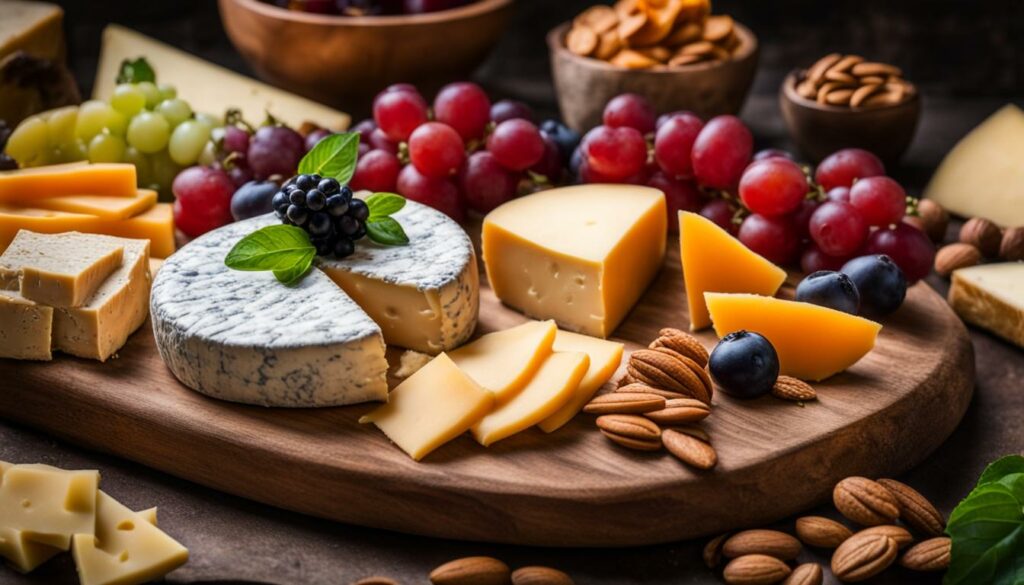
| Aspects | Homemade Vegan Cheese | Store-Bought Vegan Cheese |
|---|---|---|
| Taste and Flavor | Customizable and unique flavors | Wide range of pre-made flavors |
| Texture | Experiment with desired texture | Consistent texture across brands |
| Cost | More affordable | Varies by brand and quality |
| Ingredients | Control over ingredients | May contain additives or allergens |
| Convenience | Time-consuming but rewarding | Quick and convenient |
As you can see, each option offers its own set of merits. Homemade vegan cheese grants you the freedom to experiment and customize, whereas store-bought options provide convenience and a wider variety of pre-made flavors. Consider your priorities and choose the option that best suits your needs.
The Art of Cheese Classification
Cheese classification is a fascinating and intricate process that plays a significant role, particularly in European countries where each region boasts its own unique system. While the classification system can vary widely, a simplified approach to cheese classification revolves around two essential factors – the type of rind and the moisture content.
Starting with the rind, it comes in various forms depending on the type of cheese. Fresh cheeses, such as ricotta and mozzarella, have no rind whatsoever. On the other hand, aged fresh cheeses, like goat cheese, develop a transparent rind as they mature. Soft white rind cheeses, such as Camembert and Brie, exhibit a fine white crusty rind, while semi-soft cheeses like Port Salut or Munster can have a grey-brown rind or an orange, sticky rind. Hard cheeses, including Parmigiano-Reggiano and Gouda, often showcase a polished, waxed, or oiled rind. Likewise, blue cheeses like Roquefort and Stilton are characterized by a rough and sometimes sticky rind.
Aside from the rind, cheese classification also takes into account the moisture content. This factor determines the texture and flavor of the cheese. Soft and creamy cheeses like Burrata and Camembert possess a high moisture content, while firm and crumbly cheeses like Cheddar and Parmesan have a lower moisture content.
It’s worth noting that cheesemakers have the freedom to create their own unique cheeses by utilizing different milk sources, employing various aging techniques, and even incorporating flavorings like herbs, spices, or even truffles. To showcase the distinctiveness of their creations, it is important for cheesemakers to come up with unique and memorable names rather than imitating traditional European cheeses, allowing their cheese to shine and stand out in the market.
European Cheese Classification
European countries have a rich history and tradition of cheese production, with each region priding itself on its unique cheese varieties. As a result, European cheese classification systems are incredibly diverse. For example, France has a “Appellation d’Origine Contrôlée” (AOC) system that designates specific regions and production methods for cheeses like Camembert de Normandie and Roquefort. In contrast, Italy employs a “Denominazione di Origine Protetta” (DOP) label to indicate cheeses produced in specific regions following strict guidelines, like Parmigiano-Reggiano and Gorgonzola.
The European cheese classification systems not only protect the cultural heritage and traditional production methods associated with these cheeses but also ensure their quality, authenticity, and integrity. The specific rules and regulations help consumers make informed choices and guarantee that they are experiencing truly exceptional cheeses.
Terroir: A Reflection of Europe’s Cheese Diversity
One of the aspects that make European cheeses truly remarkable is the concept of terroir. Terroir refers to the unique natural environment, including factors such as soil composition, climate, and vegetation, which influence the taste, aroma, and overall character of the cheese. From the grass-fed cows in the Swiss Alps, providing the milk for Gruyère, to the salty sea breeze influencing the flavors of Breton buttery cheese, Terroir is a central element in the European cheese-making tradition.
European cheeses encompass a multitude of flavor profiles and characteristics, each tied to their distinct geographical origin. This rich diversity is a testament to the cultural heritage, craftsmanship, and dedication of European cheesemakers.
Discovering the Unique Cheese Names
In addition to the classification and terroir, unique cheese names play a crucial role in distinguishing European cheeses. These names are often deeply rooted in local traditions, history, or even the cheesemaker’s family name. The names reflect the heritage and individuality of the cheese, evoking a sense of connection to the land and the people behind its creation.
“In the great family of French cheeses, there are cheeses of all sizes, shapes, and smells. There are soft ones and hard ones, all taking your nostrils and taste buds on a journey. All French cheeses are blessed with a soul, a history, and an unmistakable character.”
– Jean Anthelme Brillat-Savarin
European cheeses are not merely names on a shelf but stories waiting to be shared. They serve as windows into the culinary traditions, cultural richness, and diverse landscapes found throughout Europe.
| Type of Cheese Rind | Examples |
|---|---|
| Fresh Cheeses | Ricotta, Mozzarella |
| Aged Fresh Cheeses | Goat Cheese |
| Soft White Rind Cheeses | Camembert, Brie |
| Semi-Soft Cheeses | Port Salut, Munster |
| Hard Cheeses | Parmigiano-Reggiano, Gouda |
| Blue Cheeses | Roquefort, Stilton |
Conclusion
Are you a cheese lover looking for a dairy-free alternative? Look no further than Blenda cheese. This cashew-based cheese offers a rich and creamy experience with its various flavors. But Blenda cheese is just one option among many in the market. Whether you prefer store-bought vegan cheeses or enjoy making your own at home, there are plenty of choices to suit your taste and dietary needs.
The world of dairy-free cheese is continuously expanding, providing cheese enthusiasts with more options than ever. Blenda cheese is just the tip of the iceberg. With a range of store-bought vegan cheeses to explore and homemade varieties to experiment with, you can enjoy the flavors and textures you love without compromising your dietary preferences.
So, whether you’re looking for a quick snack or a cheese-centric recipe, don’t hesitate to try out Blenda cheese and other vegan cheese options. The dairy-free cheese market is flourishing, offering an abundance of delicious alternatives. Embrace the versatility and flavors of Blenda cheese, and discover the wonders of dairy-free cheese in all its variety.
FAQ
Where can I buy Blenda cheese?
Blenda cheese can be purchased online through various retailers. It is also available in select grocery stores and specialty food stores. Check the product’s website or contact customer service for more information about where to find Blenda cheese near you.
What are the benefits of Blenda cheese?
Blenda cheese offers a delicious dairy-free alternative for cheese lovers. It is made from wholesome ingredients like cashews, nuts, seeds, tofu, and coconut. Blenda cheese is also high in healthy fats and protein, making it a nutritious choice. Additionally, it is suitable for those who are lactose intolerant or follow a dairy-free diet.
Can Blenda cheese be used in recipes?
Yes, Blenda cheese is versatile and can be used in a variety of recipes. It melts well, making it suitable for dishes like quesadillas and pizza. It can also be used in salads, sandwiches, and as a topping for pasta dishes. Get creative and experiment with Blenda cheese in your favorite recipes!
What are the different varieties of Blenda cheese?
Blenda cheese comes in various flavors, including smoky, sharp, and mild cheddar. Each variety offers its own unique taste and can be enjoyed in different recipes. Try different varieties to discover your favorite Blenda cheese flavor.
Is Blenda cheese suitable for vegans?
Yes, Blenda cheese is a vegan cheese alternative. It is free from animal products and is made from plant-based ingredients. It is a great option for those following a vegan lifestyle or who prefer dairy-free alternatives.
What are the ingredients in Blenda cheese?
Blenda cheese is made from a blend of cashews, nuts, seeds, tofu, and coconut. These wholesome ingredients create the creamy and delicious texture of Blenda cheese, without the use of dairy.
Can I find reviews for Blenda cheese?
Yes, you can find reviews for Blenda cheese online. Many retailers and websites allow customers to leave reviews and ratings for products. Additionally, you can check social media platforms and online forums for personal experiences and feedback from individuals who have tried Blenda cheese.
What is the best way to store Blenda cheese?
Blenda cheese should be stored in a cool, dry place, away from direct sunlight. It is best to keep it refrigerated to maintain its freshness and prevent spoilage. Follow the specific storage instructions provided on the packaging for optimal flavor and texture.
What if I have a nut allergy? Can I still consume Blenda cheese?
Blenda cheese is made from cashews and other nuts, so it is not suitable for individuals with nut allergies. However, there are other vegan cheese alternatives available that are nut-free. Check the ingredients list carefully or look for specifically labeled nut-free vegan cheese options.




